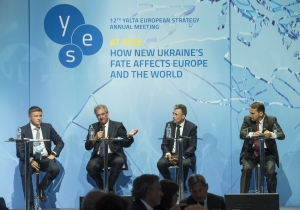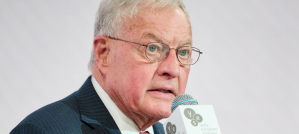Europe Expects Ukrainian Authorities to Carry Out Reforms

The Ukrainian leadership should proceed with implementing reforms, believes Anders Fogh Rasmussen, the Secretary General of NATO (2009-2014) and former Prime Minister of Denmark (2001-2009). Rasmussen spoke about how Ukraine can become a force for global stability and European values in today’s volatile global context, during the opening panel discussion "Time to Deliver! What Ukraine Expects from Europe – and Vice Versa" at the 12th Yalta European Strategy Annual Meeting in Kyiv.
"Work on the reforms should continue,” Rasmussen added. “In particular, it is necessary to resolutely fight corruption, implement the reforms of the judiciary, energy sector, government building and deregulation. I see the Ukrainian leadership has been focusing on these directions," he said.
Radoslaw Sikorski, a member of the Polish parliament and the country's foreign minister (2007-2014), noted that it is for the first time that Ukraine has a government which "makes brave decisions,” citing Ukraine’s ability to make energy prices more relevant to the market, as an example.
"What should the Ukrainian leadership do differently? Anti-corruption efforts are truly important because if Ukraine wants to be seen as a country which is about to join the European Union, rather than as a post-Soviet state, the government and people should build a relationship based on a broader agreement than in Russia or Central Asia," Sikorski said.
He further elaborated: "When Poland signed the EU Association Agreement back in the 1990s, all what was written in this agreement was our declaration and the list of commitments. You have a more comprehensive Association Agreement, and you have the unilateral consent of the Council of Europe that this agreement will not be the last document on cooperation between Europe and Ukraine. The only thing which needs to be done now is to deliver on the practical program of reforms and adapt your standards to those in Europe. You have Europe's friendliness. It will stand by its word, I am sure."
Jean Asselborn, Minister of Foreign and European Affairs of the Grand Duchy of Luxembourg, who also spoke on the opening panel, asked why Ukraine has not been a topic for discussion in Europe in recent months. "Is Europe united? There are various opinions. We have a difficult situation in Greece, southern Europe, and now the refugees. Ukraine is not mentioned often now. Nevertheless, I have to say that we are united around Ukraine as never before. You know that there was a broad discussion on the prolongation of sanctions [against Russia] and after all they were left in place until 2016," he said.
Asselborn added that many were disappointed with the outcome of the Riga Summit, however they should not be interpreted as the lack of support or unity with regard to the Ukrainian issue.
←Back to news list

